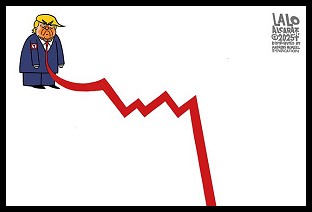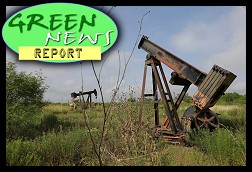
IN TODAY'S RADIO REPORT: Siberian fires set new pollution record; Atlantic hurricane season breaks new records; Trump Administration approves natural gas bomb trains; PLUS: California mandates zero-emission trucks and buses by 2045... All that and more in today's Green News Report!
Got comments, tips, love letters, hate mail? Drop us a line at GreenNews@BradBlog.com or right here at the comments link below. All GNRs are always archived at GreenNews.BradBlog.com.
IN 'GREEN NEWS EXTRA' (see links below): The scariest thing about global warming (and Covid-19); Sunrun and Vivint form new solar Goliath to challenge Tesla; Virginia joins Regional Greenhouse Gas Initiative; PA's GOP state legislature curbs state's ability to join RGGI; The next 5 pipelines facing legal trouble; Sanders-Biden Climate Task Force calls for carbon-free power by 2035; Endangered CA condors found in Sequioa NP for first time in 50 years; Ninth Circuit restores protections for Yellowstone grizzlies... PLUS: Humpback Chub 'Alien Abductions' Help Frame the Future of the Colorado River... and much, MUCH more! ...
STORIES DISCUSSED ON TODAY'S 'GREEN NEWS REPORT'...
- 2020 Atlantic hurricane season breaks even more records:
- The Atlantic hurricane season is off to a record fast start and is likely to get worse (Washington Post):
Edouard has since morphed into a nontropical storm, but it signals the possibility of a long and punishing hurricane season, which has already set records linked to abnormally warm ocean waters...[TS Dolly] flared up farther north than any tropical storm on record, said Sam Lillo, a postdoctoral researcher at the National Oceanic and Atmospheric Administration. - Tropical storm Edouard is fifth named storm of 2020, earliest such Atlantic storm on record (Dr. Jeff Masters, Yale Climate Connections):
Edouard was the earliest fifth Atlantic named storm formation on record, beating the record set by Emily on July 12, 2005. The fifth named storm of the year typically does not occur until August 31, so we are nearly two months ahead of climatology. None of this year's named storms have been hurricanes, and the first hurricane of the season usually arrives by August 10...More heat energy is available in 2020 than was the case in 2005 in many regions, so there is a high likelihood of seeing very intense hurricanes in 2020. - Tropical storm Fay likely to form - if named, would be the earliest "F" storm on record (Washington Post)
- Siberian fires break new records for carbon pollution:
- Siberia had its warmest June ever as wildfires raged and carbon dioxide emissions surged (CNN):
The area's carbon dioxide emissions for June were its highest in the 18 years of the CAMS dataset, eclipsing a record of 53 megatonnes set in June 2019. - Intense Arctic Wildfires Set a Pollution Record (NY Times):
By releasing so much carbon dioxide, the fires are contributing to global warming. And scientists say the fires could also lead to more thawing of Arctic permafrost. Decomposition of the organic matter, like dead vegetation and animals, in this previously frozen ground would result in the release of more methane, another potent greenhouse gas.- Siberian Arctic 'up to 10 degrees warmer' in June (BBC)
- The Arctic Is on Fire Again, and It's Even Worse This Time (VICE)
- Rapid Arctic Meltdown In Siberia Alarms Scientists (Washington Post)
- Arctic lakes melting sooner, releasing more climate-warming methane:
- Bubbling methane emissions caused by ice-free days in Arctic lakes (Purdue University):
"Based on our study, the increase of lake methane emission is mainly due to the warming climate and reduction of ice-on days...By reducing anthropogenic greenhouse gas emissions and mitigating the climate warming, the Arctic lakes will have longer ice-on days and lower methane production rate, thus slowing down lake methane emissions. - Siberian Arctic temperatures and fires beat all records - again (Bloomberg):
Methane, trapped in the organic matter sitting in the bottom of Arctic lakes, bubbles into the atmosphere when lakes become ice-free. The amount of methane released by Arctic lakes could rise to as much as 60 percent of all methane released due to melting in the Arctic region by the end of the century, the researchers found.
- South Pole also warming faster than rest of the planet:
- Record warming at the South Pole during the past three decades (Nature)
- South Pole warmed three times the global rate in last 30 years: study (Reuters):
Temperature data shows that the desolate region has warmed at three times the global warming rate over the last three decades up through 2018...the South Pole's hottest year on record, the researchers report in a study published Monday in Nature Climate Change. Looking at data from 20 weather stations across Antarctica, the South Pole warming rate was seven times higher than the overall average for the continent. - Even the South Pole Is Warming, and Quickly, Scientists Say (NY Times)
- South America seeing 'unprecedented' rise in extreme weather events:
- Six hundred years of South American tree rings reveal an increase in severe hydroclimatic events since mid-20th century (PNAS)
- Tree rings show unprecedented rise in extreme weather in South America (Phys.Org):
Scientists have filled a gaping hole in the world's climate records by reconstructing 600 years of soil-moisture swings across southern and central South America. Along with documenting the mechanisms behind natural changes, the new South American Drought Atlas reveals that unprecedented widespread, intense droughts and unusually wet periods have been on the rise since the mid-20th century. It suggests that the increased volatility could be due in part to global warming, along with earlier pollution of the atmosphere by ozone-depleting chemicals. - Tree Ring Records Show Increase in Extreme Weather in South America (Yale 3e360):
Researchers used the tree-ring data to reconstruct changes in soil moisture over time, part of the new South American Drought Atlas, and found that there has been a dramatic rise in severe droughts and periods of extreme rainfall in central and southern South America dating back to the 1960s.
- Trump Administration approves LNG 'bomb' trains:
- LNG shipments by rail approved in US amid pipeline battles (AP):
The Trump administration has taken the final step to allow rail shipments of liquefied natural gas, a new front in the movement of energy products that had been opposed by environmental groups and 15 states. - Trump administration moving to allow railroads to haul liquefied natural gas. Opponents say it's a risk. (Washington Post):
State and local politicians, firefighters, safety experts, Native American tribes, and the NTSB are critical of the proposed rule. - 15 states oppose Trump plan to allow LNG shipments by rail (AP, 1/14/2020)
- US signs order for first West Coast gas-export terminal (AP)
- Rock dust can help draw down atmospheric CO2:
- Potential for large-scale CO2 removal via enhanced rock weathering with croplands (Nature):
Enhanced silicate rock weathering (ERW), deployable with croplands, has potential use for atmospheric carbon dioxide (CO2) removal (CDR), which is now necessary to mitigate anthropogenic climate change. ERW also has possible co-benefits for improved food and soil security, and reduced ocean acidification. - Spreading rock dust on fields could remove vast amounts of CO2 from air (Guardian UK):
The chemical reactions that degrade the rock particles lock the greenhouse gas into carbonates within months, and some scientists say this approach may be the best near-term way of removing CO2 from the atmosphere. The researchers are clear that cutting the fossil fuel burning that releases CO2 is the most important action needed to tackle the climate emergency...Prof Jim Hansen, of Columbia University in the US and one of the research team, said: "Much of this carbonate will eventually [wash into] the ocean, ending up as limestone on the ocean floor. "Weathering provides a natural, permanent sink for the carbon." - Spreading rock dust on the ground could pull carbon from the air, researchers say (Washington Post)
- Green beaches: Project Vesta Is Using The Mineral Olivine To Remove CO2 From The Air (Clean Technica)
- California mandates zero-emissions trucks and buses by 2045:
- California approves 1st-in-US electric truck sales rule (AP):
California regulators approved new rules on Thursday that would force automakers to sell more electric work trucks and delivery vans, a first-of-its-kind rule aimed at helping the nation's most populous state clean up its worst-in-the-nation air quality. - California mandates big increase in zero-emission trucks (LA Times):
The nation's toughest clean-air mandate on trucks was approved Thursday by the California Air Resources Board...The air board will conduct a detailed survey of fleet operators with more than 50 trucks that do business in California to help determine what additional policies are needed to boost demand. The mandate takes in trucks ranging from pickups that can haul three-quarters of a ton to semi trucks that fully loaded weigh 80,000 pounds. The air board said about 75,000 such trucks are sold each year. - California's Landmark Electric Truck Rule Targets 'Diesel Death Zone' (NPR):
In another first-in-the-nation move to tackle climate change, California will require automakers to sell more electric trucks starting in 2024. The measure, approved unanimously Thursday by the California Air Resources Board, says that by 2045 all new trucks sold in the state should be zero-emissions. - California mandate: Commercial trucks go electric starting in 2024, all-EV by 2045 (Green Car Reports)
- US signs order for first West Coast gas-export terminal (AP)
'GREEN NEWS EXTRA' (Stuff we didn't have time for in today's audio report)...
For a comprehensive roundup of daily environmental news you can trust, see the Society of Environmental Journalists' Daily Headlines page
- Inside Clean Energy: Sunrun and Vivint Form New Solar Goliath, Leaving Tesla to Play David (Inside Climate News)
- Virginia joins Regional Greenhouse Gas Initiative (CBS-Chalottesville)
- Pennsylvania House OKs bill curbing state's ability to join RGGI in ongoing dispute with governor (Utility Dive)
- These 5 Oil and Gas Pipelines Are the Next to Face Trouble (Earther)
- Sanders-Biden Climate Task Force Calls For Carbon-Free Power By 2035 (The Hill)
- Endangered Calif. Condors In Sequoia Natl Park For 1st Time In 50 Years (LA Times)
- Ninth Circuit Rules To Restore Protections For Yellowstone Grizzlies (Bozeman Chronicle)
- With Atlantic Coast dead, is this pipeline next? (E&E News)
- Phoenix: How America’s Hottest City Will Survive Climate Change (Washington Post)
- Bali Hosts First Centre To Return Captive Dolphins To The Wild (Reuters)
- Boulder Climate Lawsuit Against Exxon, Others Advances (Bloomberg)
- Brazil Corporations Urge Action On Illegal Logging In Amazon (AP)
- The scariest thing about global warming (and Covid-19): shifting baseline syndrome (Vox)
- Humpback Chub 'Alien Abductions' Help Frame the Future of the Colorado River (Inside Climate News)
- Exxon's Snake Oil: 100 years of deception (Columbia Journalism Review)
- What Does '12 Years to Act on Climate Change' (Now 11 Years) Really Mean? (Inside Climate News)
- VIDEO: A Message From the Future With Alexandria Ocasio-Cortez (The Intercept)
- SEJ Backgrounder: Green New Deal Proposes Sweeping Economic Transformation (Society of Environmental Journalists)
- Explainer: The 'Green New Deal': Mobilizing for a just, prosperous, and sustainable economy (New Consensus)
- What genuine, no-bullshit ambition on climate change would look like: How to hit the most stringent targets, with no loopholes. (David Roberts, Vox)
- A Global Shift To Sustainability Would Save Us $26 Trillion (Vox)
- Project Drawdown: 100 Solutions to Reverse Global Warming (Drawdown.org)
- An Optimist's Guide to Solving Climate Change and Saving the World (Vice)
- The great nutrient collapse: The atmosphere is literally changing the food we eat, for the worse. And almost nobody is paying attention. (Politico)
- The world's bleak climate situation, in 3 charts: We've got a long way to go and a short time to get there. (Vox)
- The Climate Risks We Face (NY Times):
To stabilize global temperature, net carbon dioxide emissions must be reduced to zero. The window of time is rapidly closing to reduce emissions and limit warming to no more than 3.6 degrees Fahrenheit or 2 degrees Celsius above preindustrial levels, the goal set in the Paris climate accord. The further we push the climate system beyond historical conditions, the greater the risks of potentially unforeseen and even catastrophic changes to the climate - so every reduction in emissions helps. - The Uninhabitable Earth: When will climate change make earth too hot for humans? (New York Magazine):
Famine, economic collapse, a sun that cooks us: What climate change could wreak - sooner than you think. - A beginner's guide to the debate over 100% renewable energy (Vox):
Clean-energy enthusiasts frequently claim that we can go bigger, that it's possible for the whole world to run on renewables - we merely lack the "political will." So, is it true? Do we know how get to an all-renewables system? Not yet. Not really.
FOR MORE on Climate Science and Climate Change, go to our Green News Report: Essential Background Page
- NASA Video: If we don't act, here's what to expect in the next 100 years:


 Trump EPA Guts Enviro Justice Office: 'BradCast' 4/24/25
Trump EPA Guts Enviro Justice Office: 'BradCast' 4/24/25 'Green News Report' 4/24/25
'Green News Report' 4/24/25
 Nation's Largest Broadcaster Mandates News Outlets Hoax Viewers to Help Gut FCC Rules: 'BradCast' 4/23/25
Nation's Largest Broadcaster Mandates News Outlets Hoax Viewers to Help Gut FCC Rules: 'BradCast' 4/23/25 Trump's FCC on Precipice of Ending All Limits on Corporate Control of Local TV Stations
Trump's FCC on Precipice of Ending All Limits on Corporate Control of Local TV Stations GOP Earth Day 2025 Hypocrisies and Dilemmas: 'BradCast' 4/22/25
GOP Earth Day 2025 Hypocrisies and Dilemmas: 'BradCast' 4/22/25 'Green News Report' 4/22/25
'Green News Report' 4/22/25 Pope Francis Dies,
Pope Francis Dies, Sunday
Sunday  Sunday 'Zero Day' Toons
Sunday 'Zero Day' Toons Soc. Sec. Expert Warns DOGE Hastening Collapse, Privati-zation: 'BradCast' 4/10/2025
Soc. Sec. Expert Warns DOGE Hastening Collapse, Privati-zation: 'BradCast' 4/10/2025 'Green News Report' 4/10/25
'Green News Report' 4/10/25 Trump Blinks, Chaos Reigns, Markets Spike as Many Tariffs Remain Despite 90-Day 'Pause': 'BradCast' 4/9/25
Trump Blinks, Chaos Reigns, Markets Spike as Many Tariffs Remain Despite 90-Day 'Pause': 'BradCast' 4/9/25 SCOTUS Deportation Ruling Grimmer Than First Appears: 'BradCast' 4/8/25
SCOTUS Deportation Ruling Grimmer Than First Appears: 'BradCast' 4/8/25 'Green News Report' 4/8/25
'Green News Report' 4/8/25 Cliff Diving with Donald: 'BradCast' 4/7/25
Cliff Diving with Donald: 'BradCast' 4/7/25 Sunday 'Don't Look Down' Toons
Sunday 'Don't Look Down' Toons 'Green News Report' 4/3/25
'Green News Report' 4/3/25 'Mob Boss' Trump's Trade Sanctions Tank U.S., World Markets: 'BradCast' 4/3/25
'Mob Boss' Trump's Trade Sanctions Tank U.S., World Markets: 'BradCast' 4/3/25 Crawford Landslide in WI; Booker Makes History in U.S. Senate: 'BradCast' 4/2/25
Crawford Landslide in WI; Booker Makes History in U.S. Senate: 'BradCast' 4/2/25 Judge Ends Challenge to GA's Unverifiable, Insecure Vote System: 'BradCast' 4/1/25
Judge Ends Challenge to GA's Unverifiable, Insecure Vote System: 'BradCast' 4/1/25 Bad Court, Election News for Trump is Good News for U.S.: 'BradCast' 3/31
Bad Court, Election News for Trump is Good News for U.S.: 'BradCast' 3/31 Vets Push Back at Plan to Slash Health Care, 80K V.A. Jobs: 'BradCast' 3/27/25
Vets Push Back at Plan to Slash Health Care, 80K V.A. Jobs: 'BradCast' 3/27/25 Signal Scandal Worsens for Trump, GOP; Big Dem Election Wins in PA: 'BradCast' 3/26
Signal Scandal Worsens for Trump, GOP; Big Dem Election Wins in PA: 'BradCast' 3/26 'Emptywheel': Trump NatSec Team Should 'Resign in Disgrace': 'BradCast' 3/25/25
'Emptywheel': Trump NatSec Team Should 'Resign in Disgrace': 'BradCast' 3/25/25 USPS 'Belongs to the People, Not the Billionaires': 'BradCast' 3/24/25
USPS 'Belongs to the People, Not the Billionaires': 'BradCast' 3/24/25
 VA GOP VOTER REG FRAUDSTER OFF HOOK
VA GOP VOTER REG FRAUDSTER OFF HOOK Criminal GOP Voter Registration Fraud Probe Expanding in VA
Criminal GOP Voter Registration Fraud Probe Expanding in VA DOJ PROBE SOUGHT AFTER VA ARREST
DOJ PROBE SOUGHT AFTER VA ARREST Arrest in VA: GOP Voter Reg Scandal Widens
Arrest in VA: GOP Voter Reg Scandal Widens ALL TOGETHER: ROVE, SPROUL, KOCHS, RNC
ALL TOGETHER: ROVE, SPROUL, KOCHS, RNC LATimes: RNC's 'Fired' Sproul Working for Repubs in 'as Many as 30 States'
LATimes: RNC's 'Fired' Sproul Working for Repubs in 'as Many as 30 States' 'Fired' Sproul Group 'Cloned', Still Working for Republicans in At Least 10 States
'Fired' Sproul Group 'Cloned', Still Working for Republicans in At Least 10 States FINALLY: FOX ON GOP REG FRAUD SCANDAL
FINALLY: FOX ON GOP REG FRAUD SCANDAL COLORADO FOLLOWS FLORIDA WITH GOP CRIMINAL INVESTIGATION
COLORADO FOLLOWS FLORIDA WITH GOP CRIMINAL INVESTIGATION CRIMINAL PROBE LAUNCHED INTO GOP VOTER REGISTRATION FRAUD SCANDAL IN FL
CRIMINAL PROBE LAUNCHED INTO GOP VOTER REGISTRATION FRAUD SCANDAL IN FL Brad Breaks PA Photo ID & GOP Registration Fraud Scandal News on Hartmann TV
Brad Breaks PA Photo ID & GOP Registration Fraud Scandal News on Hartmann TV  CAUGHT ON TAPE: COORDINATED NATIONWIDE GOP VOTER REG SCAM
CAUGHT ON TAPE: COORDINATED NATIONWIDE GOP VOTER REG SCAM CRIMINAL ELECTION FRAUD COMPLAINT FILED AGAINST GOP 'FRAUD' FIRM
CRIMINAL ELECTION FRAUD COMPLAINT FILED AGAINST GOP 'FRAUD' FIRM RICK SCOTT GETS ROLLED IN GOP REGISTRATION FRAUD SCANDAL
RICK SCOTT GETS ROLLED IN GOP REGISTRATION FRAUD SCANDAL VIDEO: Brad Breaks GOP Reg Fraud Scandal on Hartmann TV
VIDEO: Brad Breaks GOP Reg Fraud Scandal on Hartmann TV RNC FIRES NATIONAL VOTER REGISTRATION FIRM FOR FRAUD
RNC FIRES NATIONAL VOTER REGISTRATION FIRM FOR FRAUD EXCLUSIVE: Intvw w/ FL Official Who First Discovered GOP Reg Fraud
EXCLUSIVE: Intvw w/ FL Official Who First Discovered GOP Reg Fraud GOP REGISTRATION FRAUD FOUND IN FL
GOP REGISTRATION FRAUD FOUND IN FL









































